HMG7200 Public Health in Practice: Critique of Social Cognitive Theory
VerifiedAdded on 2022/09/14
|7
|1625
|7
Report
AI Summary
This report provides a comprehensive critique of Social Cognitive Theory (SCT), a learning theory widely used in education, communication, and psychology to explain human behavior through a reciprocal model. Developed by Albert Bandura, SCT emphasizes observational learning, modeling, and the continuous interaction between behavioral, environmental, and cognitive influences. The report explores the four key capabilities of SCT: self-regulation, vicarious capability, self-reflection, and symbolizing capability. It delves into the application of SCT in health promotion, emphasizing its role in addressing personal and socio-structural determinants of health, and guiding individual, community, or organizational behavior changes. The report highlights the importance of self-observation, self-evaluation, and self-efficacy in evaluating the success of SCT-based interventions, including the factors of proximity and regularity. Finally, the report references several studies that support the theory's application in various contexts such as health promotion and public health, and outlines how the theory can be utilized to achieve and sustain behavioral changes.
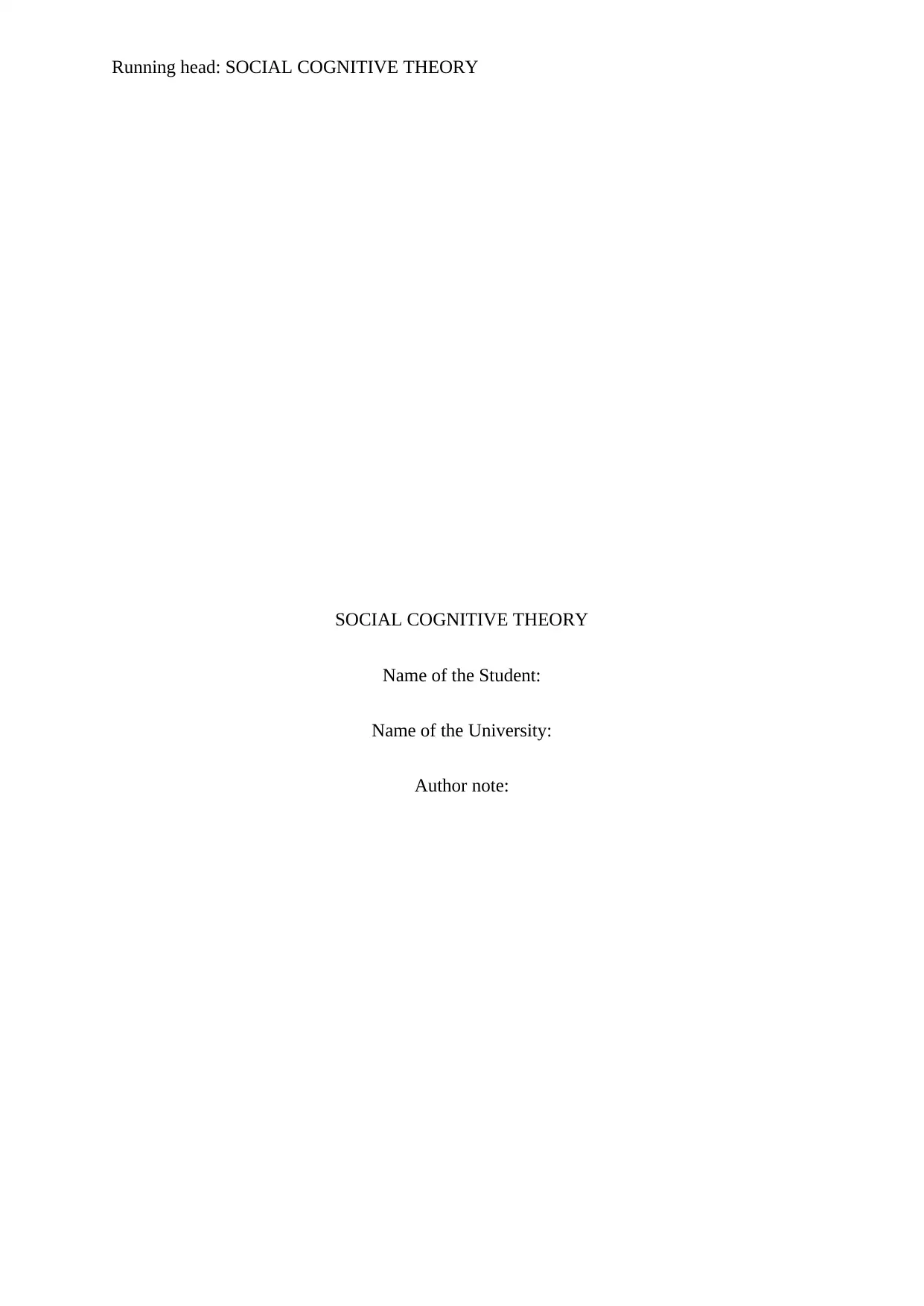
Running head: SOCIAL COGNITIVE THEORY
SOCIAL COGNITIVE THEORY
Name of the Student:
Name of the University:
Author note:
SOCIAL COGNITIVE THEORY
Name of the Student:
Name of the University:
Author note:
Paraphrase This Document
Need a fresh take? Get an instant paraphrase of this document with our AI Paraphraser
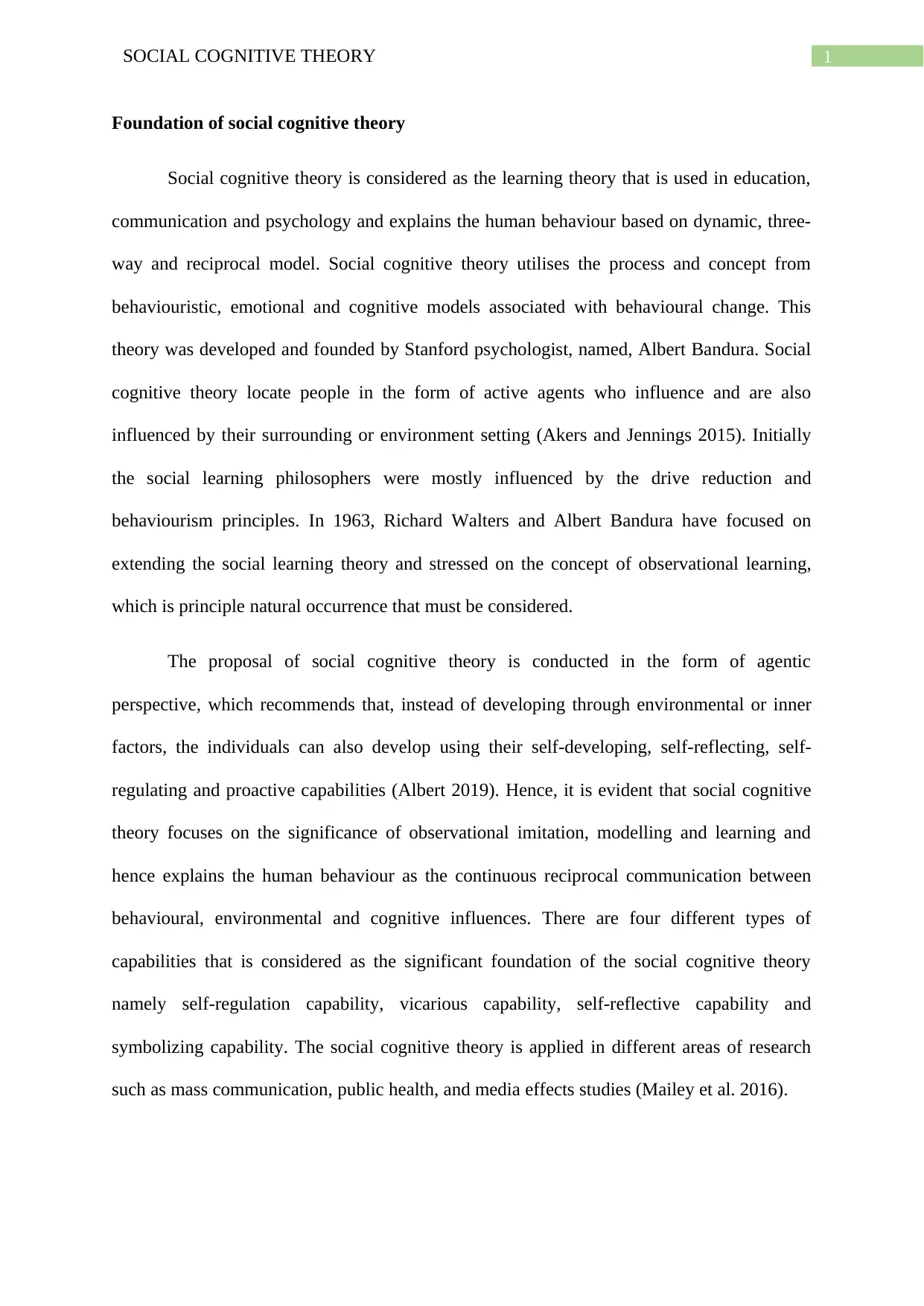
1SOCIAL COGNITIVE THEORY
Foundation of social cognitive theory
Social cognitive theory is considered as the learning theory that is used in education,
communication and psychology and explains the human behaviour based on dynamic, three-
way and reciprocal model. Social cognitive theory utilises the process and concept from
behaviouristic, emotional and cognitive models associated with behavioural change. This
theory was developed and founded by Stanford psychologist, named, Albert Bandura. Social
cognitive theory locate people in the form of active agents who influence and are also
influenced by their surrounding or environment setting (Akers and Jennings 2015). Initially
the social learning philosophers were mostly influenced by the drive reduction and
behaviourism principles. In 1963, Richard Walters and Albert Bandura have focused on
extending the social learning theory and stressed on the concept of observational learning,
which is principle natural occurrence that must be considered.
The proposal of social cognitive theory is conducted in the form of agentic
perspective, which recommends that, instead of developing through environmental or inner
factors, the individuals can also develop using their self-developing, self-reflecting, self-
regulating and proactive capabilities (Albert 2019). Hence, it is evident that social cognitive
theory focuses on the significance of observational imitation, modelling and learning and
hence explains the human behaviour as the continuous reciprocal communication between
behavioural, environmental and cognitive influences. There are four different types of
capabilities that is considered as the significant foundation of the social cognitive theory
namely self-regulation capability, vicarious capability, self-reflective capability and
symbolizing capability. The social cognitive theory is applied in different areas of research
such as mass communication, public health, and media effects studies (Mailey et al. 2016).
Foundation of social cognitive theory
Social cognitive theory is considered as the learning theory that is used in education,
communication and psychology and explains the human behaviour based on dynamic, three-
way and reciprocal model. Social cognitive theory utilises the process and concept from
behaviouristic, emotional and cognitive models associated with behavioural change. This
theory was developed and founded by Stanford psychologist, named, Albert Bandura. Social
cognitive theory locate people in the form of active agents who influence and are also
influenced by their surrounding or environment setting (Akers and Jennings 2015). Initially
the social learning philosophers were mostly influenced by the drive reduction and
behaviourism principles. In 1963, Richard Walters and Albert Bandura have focused on
extending the social learning theory and stressed on the concept of observational learning,
which is principle natural occurrence that must be considered.
The proposal of social cognitive theory is conducted in the form of agentic
perspective, which recommends that, instead of developing through environmental or inner
factors, the individuals can also develop using their self-developing, self-reflecting, self-
regulating and proactive capabilities (Albert 2019). Hence, it is evident that social cognitive
theory focuses on the significance of observational imitation, modelling and learning and
hence explains the human behaviour as the continuous reciprocal communication between
behavioural, environmental and cognitive influences. There are four different types of
capabilities that is considered as the significant foundation of the social cognitive theory
namely self-regulation capability, vicarious capability, self-reflective capability and
symbolizing capability. The social cognitive theory is applied in different areas of research
such as mass communication, public health, and media effects studies (Mailey et al. 2016).
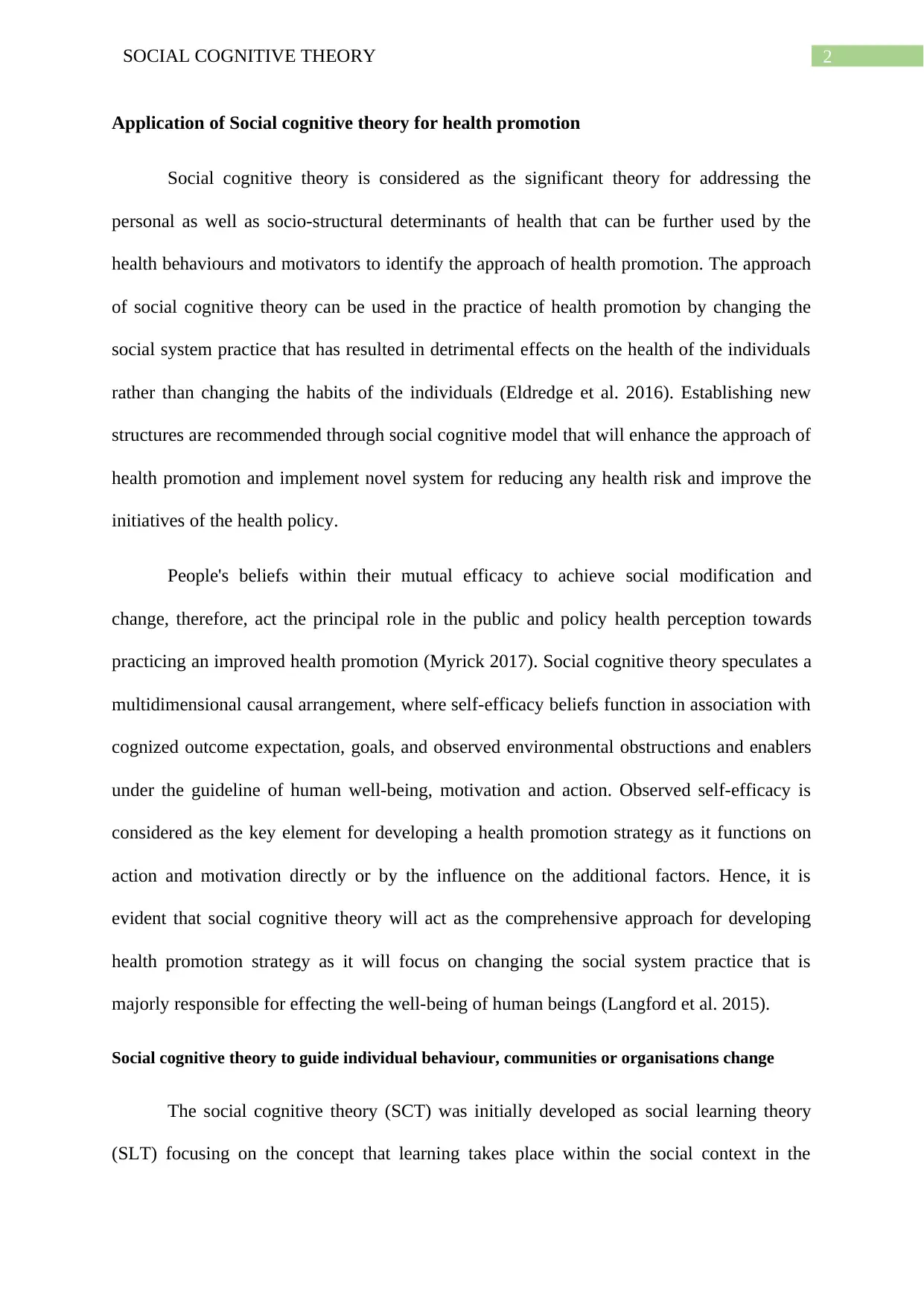
2SOCIAL COGNITIVE THEORY
Application of Social cognitive theory for health promotion
Social cognitive theory is considered as the significant theory for addressing the
personal as well as socio-structural determinants of health that can be further used by the
health behaviours and motivators to identify the approach of health promotion. The approach
of social cognitive theory can be used in the practice of health promotion by changing the
social system practice that has resulted in detrimental effects on the health of the individuals
rather than changing the habits of the individuals (Eldredge et al. 2016). Establishing new
structures are recommended through social cognitive model that will enhance the approach of
health promotion and implement novel system for reducing any health risk and improve the
initiatives of the health policy.
People's beliefs within their mutual efficacy to achieve social modification and
change, therefore, act the principal role in the public and policy health perception towards
practicing an improved health promotion (Myrick 2017). Social cognitive theory speculates a
multidimensional causal arrangement, where self-efficacy beliefs function in association with
cognized outcome expectation, goals, and observed environmental obstructions and enablers
under the guideline of human well-being, motivation and action. Observed self-efficacy is
considered as the key element for developing a health promotion strategy as it functions on
action and motivation directly or by the influence on the additional factors. Hence, it is
evident that social cognitive theory will act as the comprehensive approach for developing
health promotion strategy as it will focus on changing the social system practice that is
majorly responsible for effecting the well-being of human beings (Langford et al. 2015).
Social cognitive theory to guide individual behaviour, communities or organisations change
The social cognitive theory (SCT) was initially developed as social learning theory
(SLT) focusing on the concept that learning takes place within the social context in the
Application of Social cognitive theory for health promotion
Social cognitive theory is considered as the significant theory for addressing the
personal as well as socio-structural determinants of health that can be further used by the
health behaviours and motivators to identify the approach of health promotion. The approach
of social cognitive theory can be used in the practice of health promotion by changing the
social system practice that has resulted in detrimental effects on the health of the individuals
rather than changing the habits of the individuals (Eldredge et al. 2016). Establishing new
structures are recommended through social cognitive model that will enhance the approach of
health promotion and implement novel system for reducing any health risk and improve the
initiatives of the health policy.
People's beliefs within their mutual efficacy to achieve social modification and
change, therefore, act the principal role in the public and policy health perception towards
practicing an improved health promotion (Myrick 2017). Social cognitive theory speculates a
multidimensional causal arrangement, where self-efficacy beliefs function in association with
cognized outcome expectation, goals, and observed environmental obstructions and enablers
under the guideline of human well-being, motivation and action. Observed self-efficacy is
considered as the key element for developing a health promotion strategy as it functions on
action and motivation directly or by the influence on the additional factors. Hence, it is
evident that social cognitive theory will act as the comprehensive approach for developing
health promotion strategy as it will focus on changing the social system practice that is
majorly responsible for effecting the well-being of human beings (Langford et al. 2015).
Social cognitive theory to guide individual behaviour, communities or organisations change
The social cognitive theory (SCT) was initially developed as social learning theory
(SLT) focusing on the concept that learning takes place within the social context in the
⊘ This is a preview!⊘
Do you want full access?
Subscribe today to unlock all pages.

Trusted by 1+ million students worldwide
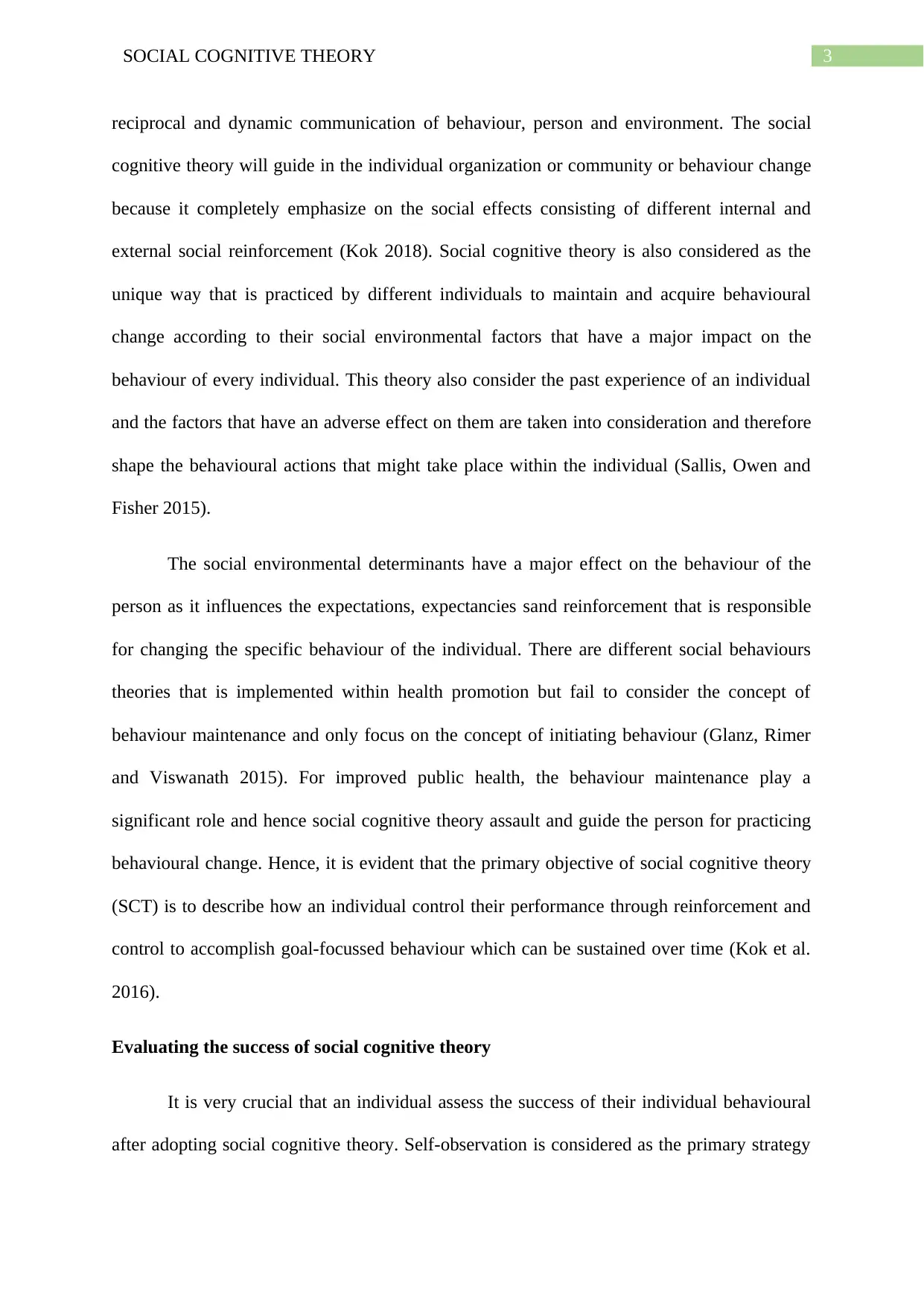
3SOCIAL COGNITIVE THEORY
reciprocal and dynamic communication of behaviour, person and environment. The social
cognitive theory will guide in the individual organization or community or behaviour change
because it completely emphasize on the social effects consisting of different internal and
external social reinforcement (Kok 2018). Social cognitive theory is also considered as the
unique way that is practiced by different individuals to maintain and acquire behavioural
change according to their social environmental factors that have a major impact on the
behaviour of every individual. This theory also consider the past experience of an individual
and the factors that have an adverse effect on them are taken into consideration and therefore
shape the behavioural actions that might take place within the individual (Sallis, Owen and
Fisher 2015).
The social environmental determinants have a major effect on the behaviour of the
person as it influences the expectations, expectancies sand reinforcement that is responsible
for changing the specific behaviour of the individual. There are different social behaviours
theories that is implemented within health promotion but fail to consider the concept of
behaviour maintenance and only focus on the concept of initiating behaviour (Glanz, Rimer
and Viswanath 2015). For improved public health, the behaviour maintenance play a
significant role and hence social cognitive theory assault and guide the person for practicing
behavioural change. Hence, it is evident that the primary objective of social cognitive theory
(SCT) is to describe how an individual control their performance through reinforcement and
control to accomplish goal-focussed behaviour which can be sustained over time (Kok et al.
2016).
Evaluating the success of social cognitive theory
It is very crucial that an individual assess the success of their individual behavioural
after adopting social cognitive theory. Self-observation is considered as the primary strategy
reciprocal and dynamic communication of behaviour, person and environment. The social
cognitive theory will guide in the individual organization or community or behaviour change
because it completely emphasize on the social effects consisting of different internal and
external social reinforcement (Kok 2018). Social cognitive theory is also considered as the
unique way that is practiced by different individuals to maintain and acquire behavioural
change according to their social environmental factors that have a major impact on the
behaviour of every individual. This theory also consider the past experience of an individual
and the factors that have an adverse effect on them are taken into consideration and therefore
shape the behavioural actions that might take place within the individual (Sallis, Owen and
Fisher 2015).
The social environmental determinants have a major effect on the behaviour of the
person as it influences the expectations, expectancies sand reinforcement that is responsible
for changing the specific behaviour of the individual. There are different social behaviours
theories that is implemented within health promotion but fail to consider the concept of
behaviour maintenance and only focus on the concept of initiating behaviour (Glanz, Rimer
and Viswanath 2015). For improved public health, the behaviour maintenance play a
significant role and hence social cognitive theory assault and guide the person for practicing
behavioural change. Hence, it is evident that the primary objective of social cognitive theory
(SCT) is to describe how an individual control their performance through reinforcement and
control to accomplish goal-focussed behaviour which can be sustained over time (Kok et al.
2016).
Evaluating the success of social cognitive theory
It is very crucial that an individual assess the success of their individual behavioural
after adopting social cognitive theory. Self-observation is considered as the primary strategy
Paraphrase This Document
Need a fresh take? Get an instant paraphrase of this document with our AI Paraphraser
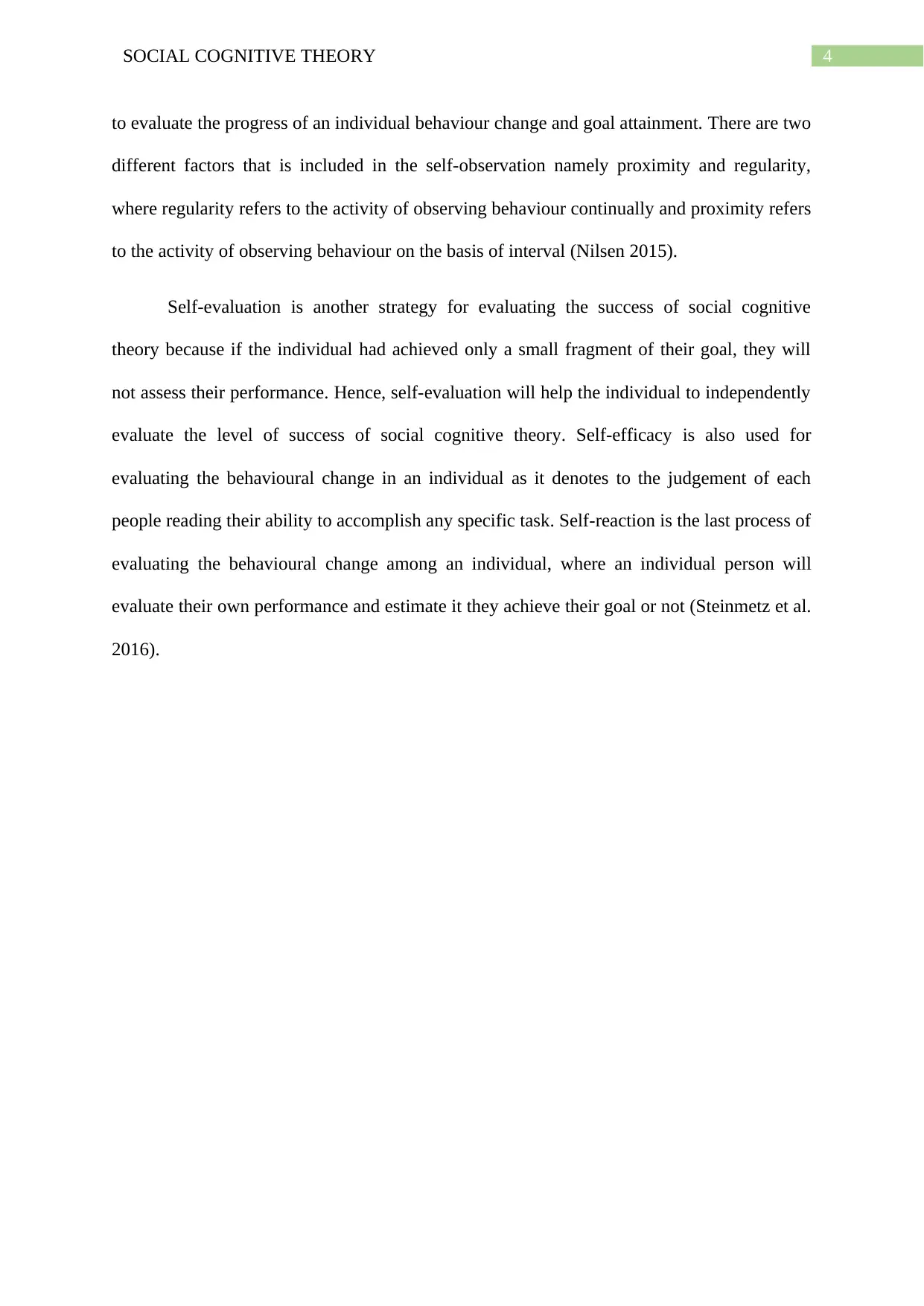
4SOCIAL COGNITIVE THEORY
to evaluate the progress of an individual behaviour change and goal attainment. There are two
different factors that is included in the self-observation namely proximity and regularity,
where regularity refers to the activity of observing behaviour continually and proximity refers
to the activity of observing behaviour on the basis of interval (Nilsen 2015).
Self-evaluation is another strategy for evaluating the success of social cognitive
theory because if the individual had achieved only a small fragment of their goal, they will
not assess their performance. Hence, self-evaluation will help the individual to independently
evaluate the level of success of social cognitive theory. Self-efficacy is also used for
evaluating the behavioural change in an individual as it denotes to the judgement of each
people reading their ability to accomplish any specific task. Self-reaction is the last process of
evaluating the behavioural change among an individual, where an individual person will
evaluate their own performance and estimate it they achieve their goal or not (Steinmetz et al.
2016).
to evaluate the progress of an individual behaviour change and goal attainment. There are two
different factors that is included in the self-observation namely proximity and regularity,
where regularity refers to the activity of observing behaviour continually and proximity refers
to the activity of observing behaviour on the basis of interval (Nilsen 2015).
Self-evaluation is another strategy for evaluating the success of social cognitive
theory because if the individual had achieved only a small fragment of their goal, they will
not assess their performance. Hence, self-evaluation will help the individual to independently
evaluate the level of success of social cognitive theory. Self-efficacy is also used for
evaluating the behavioural change in an individual as it denotes to the judgement of each
people reading their ability to accomplish any specific task. Self-reaction is the last process of
evaluating the behavioural change among an individual, where an individual person will
evaluate their own performance and estimate it they achieve their goal or not (Steinmetz et al.
2016).
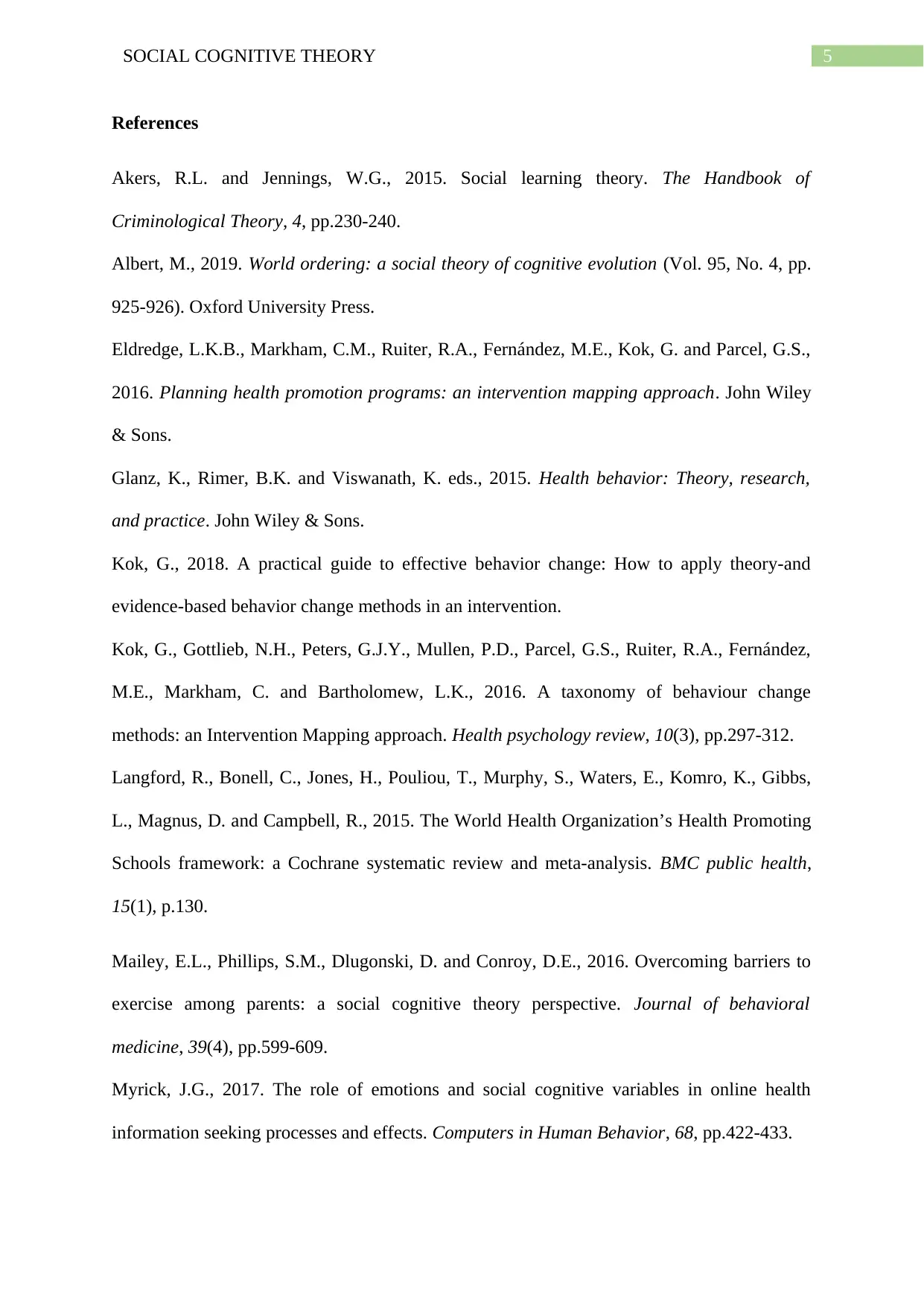
5SOCIAL COGNITIVE THEORY
References
Akers, R.L. and Jennings, W.G., 2015. Social learning theory. The Handbook of
Criminological Theory, 4, pp.230-240.
Albert, M., 2019. World ordering: a social theory of cognitive evolution (Vol. 95, No. 4, pp.
925-926). Oxford University Press.
Eldredge, L.K.B., Markham, C.M., Ruiter, R.A., Fernández, M.E., Kok, G. and Parcel, G.S.,
2016. Planning health promotion programs: an intervention mapping approach. John Wiley
& Sons.
Glanz, K., Rimer, B.K. and Viswanath, K. eds., 2015. Health behavior: Theory, research,
and practice. John Wiley & Sons.
Kok, G., 2018. A practical guide to effective behavior change: How to apply theory-and
evidence-based behavior change methods in an intervention.
Kok, G., Gottlieb, N.H., Peters, G.J.Y., Mullen, P.D., Parcel, G.S., Ruiter, R.A., Fernández,
M.E., Markham, C. and Bartholomew, L.K., 2016. A taxonomy of behaviour change
methods: an Intervention Mapping approach. Health psychology review, 10(3), pp.297-312.
Langford, R., Bonell, C., Jones, H., Pouliou, T., Murphy, S., Waters, E., Komro, K., Gibbs,
L., Magnus, D. and Campbell, R., 2015. The World Health Organization’s Health Promoting
Schools framework: a Cochrane systematic review and meta-analysis. BMC public health,
15(1), p.130.
Mailey, E.L., Phillips, S.M., Dlugonski, D. and Conroy, D.E., 2016. Overcoming barriers to
exercise among parents: a social cognitive theory perspective. Journal of behavioral
medicine, 39(4), pp.599-609.
Myrick, J.G., 2017. The role of emotions and social cognitive variables in online health
information seeking processes and effects. Computers in Human Behavior, 68, pp.422-433.
References
Akers, R.L. and Jennings, W.G., 2015. Social learning theory. The Handbook of
Criminological Theory, 4, pp.230-240.
Albert, M., 2019. World ordering: a social theory of cognitive evolution (Vol. 95, No. 4, pp.
925-926). Oxford University Press.
Eldredge, L.K.B., Markham, C.M., Ruiter, R.A., Fernández, M.E., Kok, G. and Parcel, G.S.,
2016. Planning health promotion programs: an intervention mapping approach. John Wiley
& Sons.
Glanz, K., Rimer, B.K. and Viswanath, K. eds., 2015. Health behavior: Theory, research,
and practice. John Wiley & Sons.
Kok, G., 2018. A practical guide to effective behavior change: How to apply theory-and
evidence-based behavior change methods in an intervention.
Kok, G., Gottlieb, N.H., Peters, G.J.Y., Mullen, P.D., Parcel, G.S., Ruiter, R.A., Fernández,
M.E., Markham, C. and Bartholomew, L.K., 2016. A taxonomy of behaviour change
methods: an Intervention Mapping approach. Health psychology review, 10(3), pp.297-312.
Langford, R., Bonell, C., Jones, H., Pouliou, T., Murphy, S., Waters, E., Komro, K., Gibbs,
L., Magnus, D. and Campbell, R., 2015. The World Health Organization’s Health Promoting
Schools framework: a Cochrane systematic review and meta-analysis. BMC public health,
15(1), p.130.
Mailey, E.L., Phillips, S.M., Dlugonski, D. and Conroy, D.E., 2016. Overcoming barriers to
exercise among parents: a social cognitive theory perspective. Journal of behavioral
medicine, 39(4), pp.599-609.
Myrick, J.G., 2017. The role of emotions and social cognitive variables in online health
information seeking processes and effects. Computers in Human Behavior, 68, pp.422-433.
⊘ This is a preview!⊘
Do you want full access?
Subscribe today to unlock all pages.

Trusted by 1+ million students worldwide
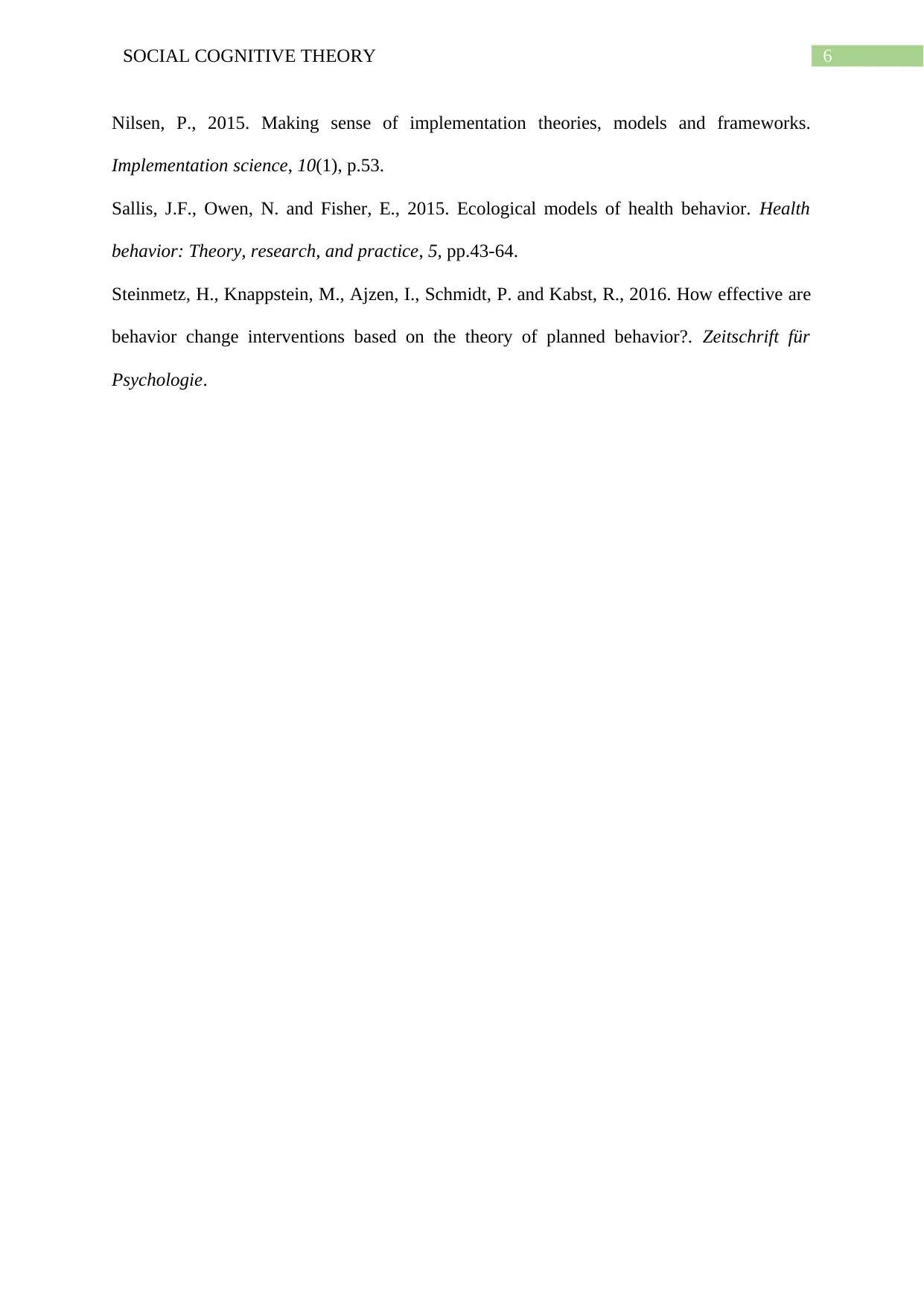
6SOCIAL COGNITIVE THEORY
Nilsen, P., 2015. Making sense of implementation theories, models and frameworks.
Implementation science, 10(1), p.53.
Sallis, J.F., Owen, N. and Fisher, E., 2015. Ecological models of health behavior. Health
behavior: Theory, research, and practice, 5, pp.43-64.
Steinmetz, H., Knappstein, M., Ajzen, I., Schmidt, P. and Kabst, R., 2016. How effective are
behavior change interventions based on the theory of planned behavior?. Zeitschrift für
Psychologie.
Nilsen, P., 2015. Making sense of implementation theories, models and frameworks.
Implementation science, 10(1), p.53.
Sallis, J.F., Owen, N. and Fisher, E., 2015. Ecological models of health behavior. Health
behavior: Theory, research, and practice, 5, pp.43-64.
Steinmetz, H., Knappstein, M., Ajzen, I., Schmidt, P. and Kabst, R., 2016. How effective are
behavior change interventions based on the theory of planned behavior?. Zeitschrift für
Psychologie.
1 out of 7
Related Documents
Your All-in-One AI-Powered Toolkit for Academic Success.
+13062052269
info@desklib.com
Available 24*7 on WhatsApp / Email
![[object Object]](/_next/static/media/star-bottom.7253800d.svg)
Unlock your academic potential
Copyright © 2020–2026 A2Z Services. All Rights Reserved. Developed and managed by ZUCOL.





